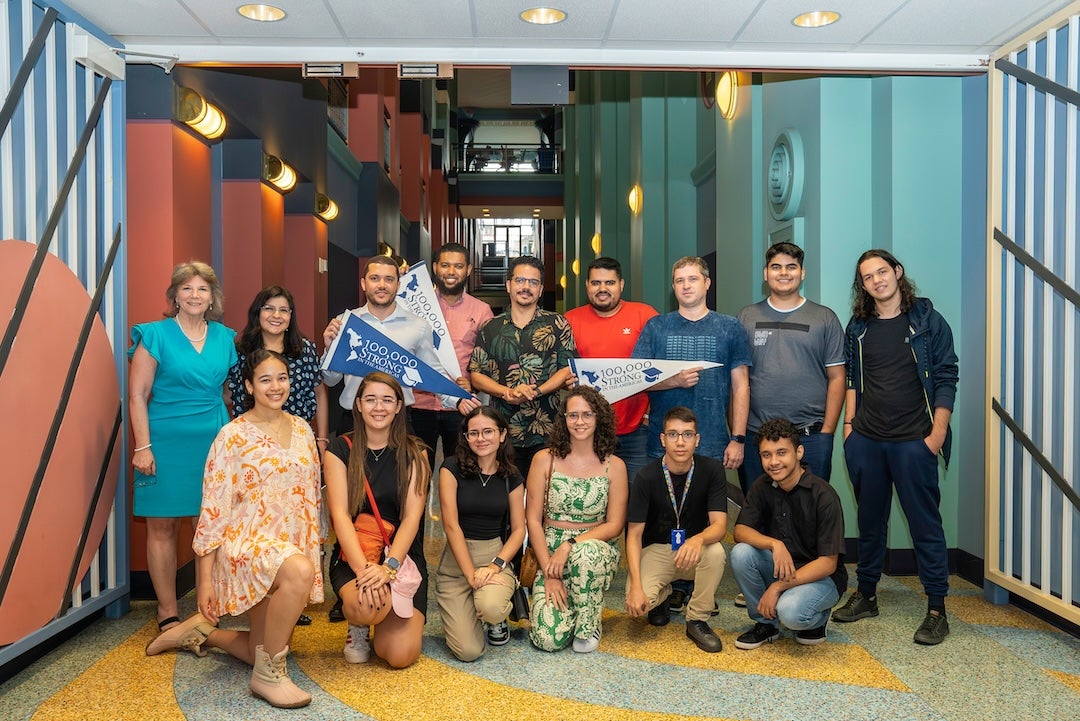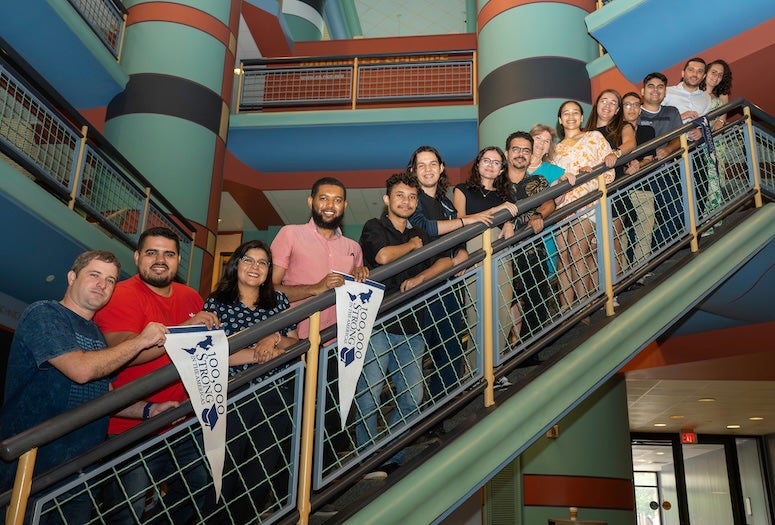Two days before Hurricane Beryl swept across Houston leaving millions without power in its wake, a group of undergraduate students and faculty from Brazil arrived on Rice University’s campus to spend a week exploring the role of artificial intelligence (AI) in sustainability and natural disaster resiliency practices.
The hurricane provided a fitting background to the group’s visit ⎯ the culmination of a knowledge and cultural exchange program funded through the 100,000 Strong in the Americas initiative, which supports higher education partnerships between the United States and countries in the Americas aimed at fostering educational and cross-cultural exchange and collaboration across borders through student mobility.

A partnership between Rice, Instituto Federal de Educação, Ciência e Tecnologia do Ceará (IFCE) and Instituto SENAI de Inovação para Tecnologias da Informação e Comunicação (SENAI), the program integrated research and development, education, cultural understanding and local partnerships to explore ways of rendering infrastructure systems more resilient in the face of hydroclimate extremes.
“In an interconnected world, crises are no longer contained at the local level, so efforts to address issues like flooding and heat waves have to not only face the specifics of local contexts but also engage with these questions on a broader scale,” said Arlei Silva, an assistant professor of computer science at Rice who spearheaded the project. “We partnered with two higher education institutions in northeastern Brazil to develop what we envisioned as a first-of-its-kind, pilot program consisting of coursework, internships and structured international student exchange both online and in person designed to offer students a better understanding of sustainability and resilience in urban settings, specifically in terms of how AI can be used to grapple with issues such as flood and power outage prediction, traffic disruption and infrastructure optimization.”
During its stay, the group visited a number of cultural and educational sites in Houston, including the Houston Space Center, the Houston downtown tunnel system, Waterwall Park and the Bilingual Education Institute. At Rice, the visitors toured the Rice360 Institute for Global Health Technologies and the Oshman Engineering Design Kitchen, attended a series of talks by Rice faculty and affiliates, met with the Rice Brazilian Student Association (BRASA) and the Brazil-Texas Chamber of Commerce and more.

The focus of the visit was a workshop featuring student presentations on their yearlong projects exploring AI methods for improving infrastructure systems to better handle hydroclimate extremes.
“It was amazing to see the results of this group’s hard work and enthusiasm, especially as we were experiencing exactly the type of event that we’d been discussing in the time leading up to this weeklong, in-person exchange,” Silva said. “For the students, this helped drive home some of the lessons from throughout the year, because it made everything sink in in a very real way. They wouldn’t typically have to worry about a weather event like Beryl in the area in Brazil where they are from, so this was, in a way, an opportunity to underscore how important and timely this work is (Brazil is also impacted by flooding but not hurricanes).”
Silva added that he was grateful for the support from the Rice community that made the visit a success despite the storm.
“I would like to thank speakers in the workshops and lectures, tour guides and hosts, undergraduate and graduate students who met with the visitors and Rice staff who helped with all the logistics, including the essential workers who allowed us to use the campus during that week, even as some of them were without power at home,” he said.

The highlight of the trip was a ceremony inducting the visitors as honorary Texans officiated by Adria Baker, who is a Rice lecturer and previously served as the associate vice provost for International Education and Brasil@Rice.
“Experiencing a different culture firsthand has a transformative impact, and it was a joy and an honor to help welcome this group from Brazil during their visit,” said Baker, who collaborated with Silva on the 100,000 Strong in the Americas funding opportunity and played a pivotal role throughout the project proposal preparation and implementation.
One of the participating students, Elyenay Mikaelle Nascimento Bandeira, said the program offered an inspiring experience that broadened her perspective.
“I am the third person in my entire family to have a degree, and I am the first engineer,” said Bandeira, a fifth-year forestry engineering student at Rural Federal University of Pernambuco and a cartography intern at SENAI. “I never thought that one day I would have the opportunity to participate in a program such as 100,000 Strong in the Americas and experience Rice University, but I did, and it made me start dreaming bigger.”

Júlio Vieira da Silva, a second-year student in telecommunications engineering at IFCE, said taking part in the program allowed him to develop a new perspective on problem-solving.
“This journey not only enhanced my skills but also opened my eyes to the importance of interdisciplinary collaboration and technological innovation in problem-solving,” da Silva said. “I realized that by integrating different areas of knowledge, we can create more efficient and impactful solutions to real-world challenges.”
Other co-principal investigators on the project are James Doss-Gollin, assistant professor of civil and environmental engineering at Rice; Carlos Mauricio Jaborandy de Mattos Dourado Jr., associate professor at IFCE; and Geraldo Gomes da Cruz Junior, specialist industrial researcher at SENAI.

In addition to being the recipient of an award through the 2021 U.S.-Brazil Innovation Fund Grant Competition supported by the U.S. Department of State, SENAI and Partners of the Americas, the IFCE-Rice-SENAI program is also partially funded through a Google Research exploreCSR award. Additional partners of the program include Rice’s George R. Brown School of Engineering, Office of International Students and Scholars, the Ken Kennedy Institute, the Brasil@Rice Office and BRASA.
-
Video is available at:
-
https://www.youtube.com/watch?v=CguDSWzV1qc&t=2s
Description: This program between Rice University, Instituto Federal de Educação, Ciência e Tecnologia do Ceará and Instituto SENAI de Inovação para Tecnologias da Informação e Comunicação integrates research and development, education and local partnerships to improve infrastructure systems to better handle hydroclimate extremes. The goal of the program is to train a new generation of students, in partnership with local stakeholders, in artificial intelligence for infrastructure, climate and urban data to address challenges caused by extreme weather. In the end, the program will lead to innovations in construction and engineering, transportation infrastructure and software sectors by developing new AI and big data software for the design of resilient infrastructure.
- Image downloads:
-
https://news-network.rice.edu/news/files/2024/07/240711_Brazilian-Delegation_Gustavo-6.jpg
CAPTION: Arlei Silva is an assistant professor of computer science at Rice University and lead investigator on the program titled “IFCE-Rice-SENAI Program on Artificial Intelligence for Urban Sustainability and Resilience to Natural Disasters in the Americas.” (Photo by Gustavo Raskosky/Rice University)
https://news-network.rice.edu/news/files/2024/07/240711_Brazilian-Delegation_Gustavo-10.jpg
CAPTION: Brazilian students and faculty and U.S. hosts in the IFCE-Rice-SENAI program participated in a weeklong, in-person meeting at Rice as part of a yearlong initiative aiming to establish a long-term US-Brazil research and education collaboration between the three institutions. (Photo by Gustavo Raskosky/Rice University)
https://news-network.rice.edu/news/files/2024/07/student-presentations.jpg
CAPTION: Brazilian students giving project presentations (Photo courtesy of Arlei Silva/Rice University)
https://news-network.rice.edu/news/files/2024/07/240711_Brazilian-Delegation_Gustavo-9.jpg
CAPTION: One of the goals of the IFCE-Rice-SENAI collaboration is to train a new generation of Brazilian and American students on AI for infrastructure, climate and urban data, and to partner with affected stakeholder groups in their respective communities to address ongoing and future challenges caused by extreme weather in the Americas. (Photo by Gustavo Raskosky/Rice University)
https://news-network.rice.edu/news/files/2024/07/240711_Brazilian-Delegation_Gustavo-3.jpg
CAPTION: Brazilian students engage in discussion following a lecture by Tilsa Oré Mónago, a lecturer for the Master of Energy Economics program at Rice University and a fellow in energy and market design at Rice’s Baker Institute for Public Policy. (Photo by Gustavo Raskosky/Rice University)

